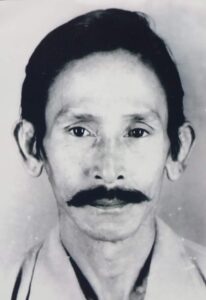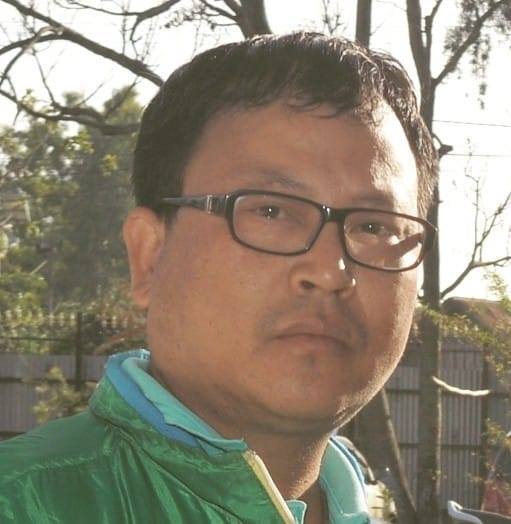
In 1960s, challenging system is not fancy work. It was also true for Tamo Nk. The greatest whistle blower of the second half of the 20th century and who exposed the corrupt, dark system of Manipur in the Yukhal Marumda of the Lamyanba monthly journal published by PANMYL was in itself was a great challenge. He is none other than a revolutionary founder member of United National Liberation Front (UNLF) and a pioneer of investigative Journalism.
Born on the eastern bank of the Imphal River at Singjamei Wangma Kshetri Leikai, Imphal East, no one at the time knew that a pioneer of the revolutionary movement in Manipur had been born on the cold day of December 30, 1936, into an ordinary family of Singjamei Kshetri Leikai. No gun salute was given, and no court singer was present. As a new person in Manipur, he kicked for the time in a dark atmosphere of Manipur, full of injustice, discontent, and fear of uncertainty. In those days, the fate of every single person born in Manipur was the same. He was subjected to the strict rules of prevailing feudal-colonial rule. No one was free to speak out what he felt freely; one had to suppress his own anger. Speaking out of anger was either a sin or a crime. State torture under one pretext or another was the rule of the game. He is none other than a revolutionary founder member of UNLF and a journalist, Nk Sanajaoba, everybody called Tamo Nk.
Young Sanajaoba had a strong, agitating attitude towards the system because he was so angry with it. He was so angry that the people could not open their mouths to express their likes and dislikes. Unlike other middle-class leaders of the time, he had no followers but a few friends to fight the injustice and to raise his voice for the liberation of justice. The injustice was structured, and hence, to bring justice, the only means was to fight against the system. To him, a new order, a new Leisemba, was the only option available to the people of Manipur.
Challenging the system is not fancy work. The sleeping people, whose potential was great, were accustomed to the hegemonic socialisation of the feudal-colonial (or colonial) system. The soft and stylish expression of the time lured the sleeping people, so their sphere of consciousness could not be changed unless a new medium of expression of anger was used. The minds of sleeping people should be provoked with new vocabulary and tones.
The stylish expression of leisure class had to be replaced with rough and tough ones. He used Lamyanba, the monthly publication of the Pan Manipuri Youth League, published since 1968, as his medium to express his and his friends’ (Itaos’) anger. The existing system taught the sleeping people to suppress anger, as it disturbed one’s journey towards moksha.
Everyone in those days subscribed to the feudal maxim, Ningthou Semba Yaoganu, Ningthou Kanba Yao. NK Sanajaoba, who wanted to change the literal Ningthou-system, encouraged the people to bring out a new Leisemba, in which no one is superior to anyone and no Sorarel would bar any women from using river water. An order of Mannaba Khunnai, a goal of liberation for justice, could only be achieved through the expression of anger. For the new Leisemba, new horizons are to be carved.
His new style of expression and his committed goal could appeal to the youthful minds of the late sixties and early seventies. His voice could gain momentum gradually. History witnessed the birth and practice of a new ideology. With his witty comments, filled with anger, he exposed the reality behind the existing social reality.
He found, behind the rhetoric of democratic principle, i.e., Yukhal Marumda, corrupt practices of the ruling class, exploitation, and suppression of new ideas and ideals. The whistle blower exposed the corrupt and dark system, for which he had to face oppressive hands.
Amidst the social outrange, triggered by the ruling class and its agencies, against his fearless efforts to wake up the sleeping people, amidst the suffering inside jail cells, he always smiled because his sufferings were examples with which the people would raise their voice against the system of injustice. His stand in those suffering days was based on what Mao Tse Tung once said: In times of difficulty, we must not lose sight of our achievements, must see the bright future, and must pluck up our courage.
The tireless efforts and endless sufferings of the great Athou-Licha-Heppa did not go in vain. His voice echoed in the sky of Manipur, and a new tradition of protest was set. Understanding the habi-jabi of the system, his expression of anger is well valued today.
The voice for equality, not only before the law but also at all fronts and levels, has become the mantra of real political practice since the birth of Lamyanba and has been the basis of every single resistance in contemporary Manipuri. The humble Athou-Licha-Heppa knew how the ruling class benefited from the system of injustice, but he did not negotiate with the system.
On the other hand, he did not want the people of Manipur, the great Manipuris, to step down to occupy inferior status. The people should live with dignity, be shaped by our own history, and protect the pride of a nation. Any act against any single person of the nation was considered an encroachment on our national journey; hence, he was so shocked by the Indian army’s torture of Rose or any single individual.
Lamyanba Nk Sanajaoba could not see the people being treated as inferior beings. Awake with pride, not with begging hands for some material benefits. Understand the people as a product of a long historical process in this part of the world. We are not inferior people who need the mercy of outsiders.
His ‘heavenly abode’ is the Lamyanba Complex, which was created by him and his itaos for the radiation of new thoughts and ideas as well as the source of driving force while practicing the new maxims of Leisemba. The complex became a new symbol of fighting back against the hegemony of the existing system. The people of Manipur still look at this complex as a sacred place for the new order.
Lamyanba NK Sanajaoba is a dynamic person who fought conventional wisdom. A mere floral tribute to him as a conventional method of remembering him would not let a hundred new flowers bloom in the complex. The complex should always be a combination of lamyanba of new ideas and resistance to a new order. The real understanding of this Athou-Licha-Heppa is to translate his ideas into action and to let his ideas grow in this new historical era.
Today, the people of Manipur know what he expressed, why he expressed it beyond the style of the leisure class, and what his goal was. Remember one of the greatest political actors of the second half of the 20th century? His itaos are still cultivating the gist of his fire. Let the fire be burned and burn every injustice; let the fire bring out a new Leisemba and burn all forms of inequality.












